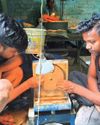'Story of human origin is still not figured out or over'

Lucy's discovery marked a critical moment in our understanding of the origins of humanity-and of Ethiopia's place at the heart of this story. Many other important fossils have since been discovered in the same Afar region—including by Yohannes Haile-Selassie, one of Ethiopia's leading paleoanthropologists and the director of the Institute of Human Origins at Arizona State University (ASU) in the US. His two Ardipithecus discoveries in the 1990s-while still a student-pushed understanding of our ancient origins back beyond 5 million years, changing some of the widely accepted beliefs about human evolution.
Yet in this interview, Haile-Selassie is critical that the study of ancient humans still fails to acknowledge and support the fundamental role of African scientists and institutions. Like many of his colleagues, he is now calling for paleoanthropology to be "decolonised", warning that otherwise, some African countries could take action to restrict future exploration of key sites across the continent:
Yohannes, you were a 14-year-old schoolboy in Ethiopia when Lucy was discovered. What are your memories of this landmark moment in your country’s history?
In fact, on the day Lucy was found —Sunday, November 24, 1974— Ethiopians woke up to some other devastating news. The previous night, Ethiopia’s military regime had executed more than 60 ministers and generals of Emperor Haile-Selassie’s regime. The announcement of Lucy’s discovery probably came up later that week, but I doubt many people paid attention to it amid all the turmoil, with the military regime taking control of Ethiopia.
Personally, I have no recollection of the announcement of Lucy’s discovery. I grew up in a Christian family, so as far as I knew at that time, it was God who created humans and I wouldn’t have understood the significance of Lucy.
この記事は Down To Earth の January 16, 2025 版に掲載されています。
7 日間の Magzter GOLD 無料トライアルを開始して、何千もの厳選されたプレミアム ストーリー、9,500 以上の雑誌や新聞にアクセスしてください。
すでに購読者です ? サインイン
この記事は Down To Earth の January 16, 2025 版に掲載されています。
7 日間の Magzter GOLD 無料トライアルを開始して、何千もの厳選されたプレミアム ストーリー、9,500 以上の雑誌や新聞にアクセスしてください。
すでに購読者です? サインイン

Reluctant to share
Even three decades after panchayats received constitutional status, states across India seem unwilling to share power with them

GET THE BALANCE RIGHT
India currently relies on three major food crops—rice, maize and sugarcane—for ethanol production. Ethanol-blended petrol supports the country’s goals of carbon neutrality and energy sovereignty. But the transition to clean energy must not jeopardise food security.
Brazil outbreak triggers poultry export bans
A TOTAL of 24 governments, including India, China, South Africa and the EU, announced a complete ban on poultry products from Brazil by the end of May, after the Latin American country confirmed an outbreak of avian influenza.

TRICKY TRAJECTORY
Indirect emissions from land-use changes, overexploitation of water resources must not be ignored in the pursuit of biofuel

MIND THE TRADE-OFF
In times of climate change, a careful roadmap must be drawn to plan how much of food crops can be diverted to fuel production

May mayhem
The 2025 monsoon arrived a week early and raced across India in May, breaking records with its speed and intensity

LOST IN MAIZE
Ethanol-blending programme and its spiralling impacts on food inflation, nutrition availability

World at risk of losing ice sheet, glaciars
THE ANTARCTIC ice sheet, which has the biggest potential for sea-level rise upon melting, may be at or very close to a tipping point, says a study published in Communications Earth and Environment on May 30.

Artwork by nature
Once close to disappearance, Banda's shajar stone handicraft industry is on a revival path

World at risk of losing ice sheet, glaciars
THE ANTARCTIC ice sheet, which has the biggest potential for sea-level rise upon melting, may be at or very close to a tipping point, says a study published in Communications Earth and Environment on May 30.
